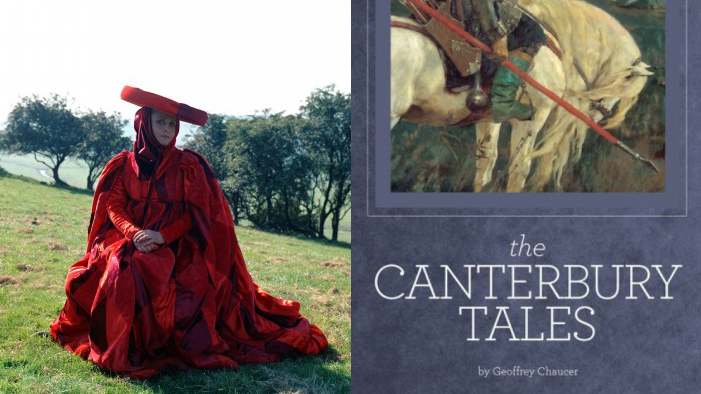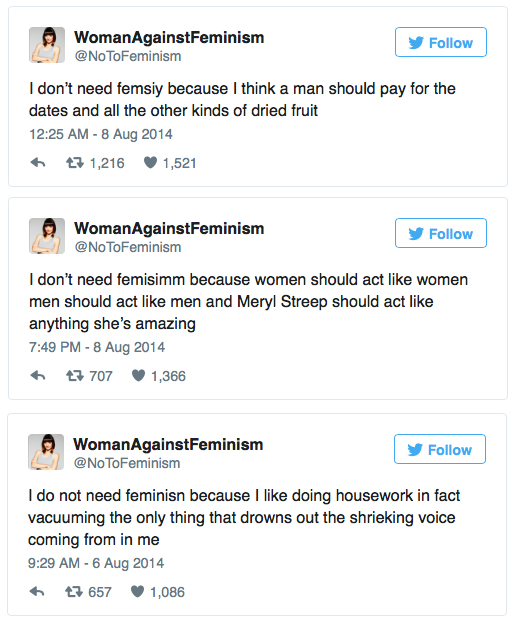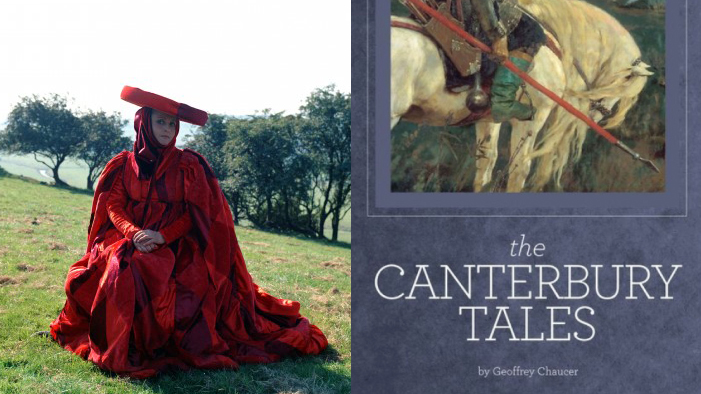Is the Wife of Bath Feminist?

I’ve come to believe that “Wife of Bath: feminist or no?” is an essay question every English teacher must ask at least once, lest they invoke the ancient magic that swallows our world in darkness. I was an English major with a focus on medieval literature (I’m fun at parties, I swear), so I think I wrote this exact essay upwards of four times.
For the uninitiated, Geoffrey Chaucer wrote The Canterbury Tales about a ragtag group of misfit pilgrim people swapping stories on their journey to see the shrine of Thomas Beckett. One such storyteller was the Wife of Bath. She opened with a rollicking prologue chock full of explicit personal anecdotes (as well as some of the filthiest Middle English euphemisms you’ve ever heard in your LIFE) before launching into a tale about a pillaging knight. 600 years later, sleep-deprived students were forced to write essays about her.
I’m guessing you’re one of those students. Maybe that’s why you’re here. Maybe you’re writing your essay right now. Look, I don’t blame you for Googling it instead of actually doing the work yourself. We’ve all been there. God knows I have. This is why I have technically taken two whole astronomy classes but still know nothing about Kepler’s third law, and I live in fear of the day this comes back to bite me.
But back to the Wife of Bath and her feminism, or lack thereof. It’s a tough, multifaceted question, and you can’t write a decent essay without taking those facets into account. So let’s consider:
IRONIC ANTI-FEMINISM
Some scholars claim the Wife of Bath perpetuates negative portrayals of women instead of dismantling them; thus, they say, she is an anti-feminist figure. But it’s also true that her particular brand of colorful humor closely aligns with the modern concept of ironic anti-feminism. If you’re unfamiliar with the term, take a look at this parody Twitter account.

To better understand how this relates to the Wife of Bath, consider comedian Ali Wong. She has a stand-up comedy special called “Baby Cobra” that relies on a recurring joke about her desire to be a housewife. She doesn’t want to work, she says; she wants to stay home all day and watch Netflix and eat snacks. Because of twenty-first-century female empowerment, however, she’s expected to be constantly doing things like EARNING A LIVING and BEING INDEPENDENT. Ugh. Thanks a bunch, Beyonce.
(I’m reminded of this joke every time I see something like “Remember the good old days when a woman could just marry a man for his money?” and I reblog it with #me. Of course I don’t actually want to marry a man for his money, but the sentiment speaks to a pervasive Internet subculture of postmodern irony that resonates with me, and I need those tumblr notes.)
Ali Wong’s stand-up routine really sings because she’s actively reveling in a stereotypical fear. We’re told that men are afraid of being tricked into marriage, as per Kanye West’s iconic hit Gold Digger and also every sitcom in the history of cable TV. The Wife of Bath capitalizes on a similar phobia. She embodies everything medieval men are said to dislike about women—she’s overtly sexual, she’s not particularly attractive, she’s bawdy, and she weaponizes her sexuality to assert dominance over her many husbands. She goes to great lengths to describe the way she acquires, and enjoys, power (and she even does so in what’s essentially the medieval version of stand-up comedy). The other characters are so put off by this that the Pardoner interrupts her to say that he’s now afraid of getting married. It’s like he just came out of the theater after seeing Gone Girl.
Look, I’m not saying the Wife of Bath is a clear expression of ironic antifeminism or that Chaucer was ahead of his time (I’m definitely not saying that; see below). What I am saying is that sometimes it’s possible to subvert narratives to make points, and that this is a relevant critical lens with which to consider the text.
AUTHORIAL INTENT
This feels unfair, I know. How the hell are we supposed to know what Chaucer was getting at when he created the Wife of Bath? It’s not like we can ask. He is dead, after all, like some kind of idiot. Besides, I’m betting nobody was asking him about any of this in 1410, largely because they didn’t care but also because everyone was busy doing things like dying in childbirth and being at war with France.
But it’s worth noting that Chaucer was going through some legal trouble when he wrote The Canterbury Tales. He was accused of (but never charged with) “raptus,” which meant either “rape” or “abduction,” because apparently in the Middle Ages everyone thought it would be cool if words had multiple, wildly different meanings. His accuser, a woman named Cecily Chaumpaigne, ultimately dropped the charges.
It was so long ago that we will likely never know what Chaucer was guilty of, if anything. But this feels like necessary context, given that Chaucer wrote the Wife of Bath’s tale about a knight convicted of rape who acquires the forgiveness of a court of women led by Queen Guinevere. This is also worth remembering when we consider 1) Chaucer’s characterization of the Wife as an insatiable sex witch, and 2) that the moral of her tale is that what women want most is “soveraynete,” or control. Chaucer is essentially telling us what he thinks women want most and using the Wife of Bath’s character to do so, which doesn’t feel particularly empowering.
That said…
THE FALSE DICHOTOMY OF THE STRONG FEMALE CHARACTER
As humans, we like to dichotomize things. It’s neater that way. Things are either black or white, good or bad, waffles or tacos. We forget sometimes that things can be gray, or neutral, or waffle tacos. This is what’s referred to as a false dichotomy.
Here’s a relevant, modern-day example: the “strong female character.” I like ladies in movies. I’m a big fan. But Hollywood directors nowadays seem to think that letting a woman be both strong and vulnerable is like dividing by zero. They seem to think the two terms are mutually exclusive. They’re like, “You want a token lady character who can shoot bullets out of her eyes? NO PROBLEM. She doesn’t have any weaknesses or much by way of personality, but she CAN break a door with her face.” They don’t seem to realize that what challenges convention is complex female characters, not female characters who can punch things.
And false dichotomies go back a long way. The idea of fictional women having to be one thing or the other speaks to a particular brand of Madonna-whore complex that was just DOMINATING the cultural zeitgeist in the 1400s. Woman-wise, in the Middle Ages, you were either a paragon of feminine perfection or you could GTFO. You were gross, or you were exalted. And on a scale of 1 to the Virgin Mary, the Wife of Bath was certainly no saint.
What I’m getting at here is that—whether you’re a medieval bard writing biblical fanfiction, a Hollywood film director, or a sleep-deprived college student living off Doritos—trying to shoehorn the Wife of Bath into a single category perpetuates the longstanding myth that women exist on a strict binary.
The Wife of Bath is, by my count, many things. She is:
- Strong
- Vulnerable
- Someone who manipulated the limitations imposed upon her to rise above oppression
- Clever
- Often drunk
- A fictional character created by a man whose history with women is unscrupulous at best
None of these things is less true than the other. You’ve probably worked out by now that I’m not here to do your homework for you—not unless you have a teacher who’s cool enough to pose the question “Is the Wife of Bath a feminist portrayal?” and accept “I don’t know, maybe” as an answer. This is mostly because I’d get in trouble (I can’t just GIVE you the ANSWER, how will you LEARN), but also because I believe it’s the wrong question to ask.
The Wife of Bath is a domineering, headstrong, and ambitious opportunist. She wants financial control, sex, and a subservient partner. In short, what makes her so formidable to her fellow pilgrims is that she’s a woman who possesses qualities typically associated with men. By creating the Wife of Bath, Chaucer tells us what he believes to be true of the opposite sex—but in doing so he inadvertently reveals more about men than he does about women, and what he reveals is this: that what men fear most is being treated the way they treat women already. He acknowledges that society has drawn a dividing line between men and women, and he tells us men fear the blurring of this line, of subverting it, of erasing it altogether.
We’ll spend the rest of our collective academic careers debating whether the Wife of Bath is feminist or not, but a better question would be “What does Chaucer’s characterization of the Wife of Bath reveal about gender politics, and to what extent is this true even today?”














